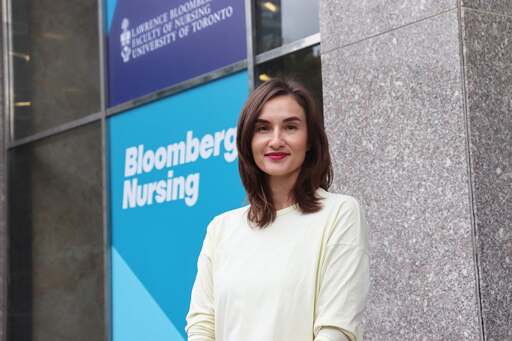In her words, she felt she could be a better nurse than a physician and didn’t want to sacrifice time with her family. That feels like a powerful, human centered path forward. It’s a reminder that success isn’t always about labels, but about meaningful impact and joy.
Shouldn’t we be upset that at a time when the shortage of doctors means a significant portion of the population does not have a primary care physician, a trained physician who cared for patients in another country cannot practice in Canada but rather has to retrain as a nurse?
She says she sees nursing as an opportunity to engage more deeply with patients through communication and empathy. “I feel that I can be a better nurse than a physician,” says Tretiak, who currently works in a retirement home for Ukrainian-speaking older adults.
“I had lost a lot of people already – including many of my friends – and I no longer connected my happiness to my professional goals. It felt impossible to go back to that kind of a life and I didn’t want to sacrifice my time with my family.”
I’m going to suggest we shouldn’t force her to do something she doesn’t want to do.
Except the article also says that she tried to get accredited as a doctor but the amount of paperwork was simple too much.
She came here and wanted to stay a doctor but red tape made it too difficult. So she has chosen an option that still lets her help people. I’m happy that she’s comfortable with her decision but it wasn’t her first choice. She wanted to stay a doctor when she got here.
It’s a shame we make it so difficult for doctors to emigrate and recertify in Canada when we have a need for them.
Not exactly.
When Tretiak first arrived in Canada in December 2022, she looked into obtaining a license to practice medicine, but the complexity of the process and volume of paperwork led her to reassess her priorities.
That doesn’t say she thought it was “too much.” It says she decided it wasn’t what she wanted to do.
You can argue that the process is too much - and it probably is, at least in places - but she pretty directly states that it led to her deciding that she didn’t actually want to be a doctor, and would rather be a nurse.
I think I can be excused for paraphrasing “the complexity of the process and volume of paperwork” as “too much”. I doubt anyone read that and thought “must be easy”.
She saw what was required and that “led her to reassess her priorities”. If the process were easier she wouldn’t have been “led” to reassess those priorities.
If the process were easier she wouldn’t have been “led” to reassess those priorities.
How does an easier process change her conclusion of, “I would be happier as a nurse?”
You’re missing the point. That was the best choice given thar she didn’t have the resources to continue doing what she would have wanted to do.
She’s be happier as a nurse because of, not despite of, the difficulties she faced.
I really think you’re putting words in her mouth.
“It felt impossible to go back to that kind of a life and I didn’t want to sacrifice my time with my family” has absolutely nothing to do with the process of transferring credentials to Canada, and everything to do with the job itself. “I feel that I can be a better nurse than a physician" speaks for itself.
There are plenty of stories about the challenges of transferring credentials. This, by her own account, as quoted in this article, is not one of them.
What part of “led to reassess her priorities” based on the “complexity of the process and volume of paperwork” do you not comprehend?
If the process were easier she would already be a doctor.
But the process is so difficult she had to ask if it was worth going thru all of that to be a doctor.
You’re clinging to her being “happier” pursuing nursing. A pursuit she wouldn’t have even considered if the process to become accredited were easier.
Well I’m happy for her - it sounds like it’s a good thing that she reconsidered her life goals, and found something more fulfilling.
This is actually a really complex issue, it’s not just a matter of government will or changing a law or two.
Medical school + internship can be a 7 to 10 year educational process. The process of vetting all of that education occurring in foreign nations to make sure it meets our medical standards can be a years-long project in itself, which requires some level of access and co-operation from the foreign nation. This obviously can’t be done on a case by case basis. Canada has undertaken this successfully with some other countries… which is why (in BC anyways) we are blessed with a bunch of really great South African doctors.
One of the big hitches is this: no country wants its doctors going overseas. It takes a somewhat unique case, where a nation has an excess of doctors perhaps, and where govt and medical associations agree they should embark on standardizing their medical training with a foreign nation and start exporting some of their doctors.
On the Canadian side, the biggest impediment is likely our own medical associations. They are the ones finally responsible for accrediting foreign education, which you can imagine requires a lot of diligence, and we don’t want them rushing this process. We might ask though, whether protectionism slows them down more. They are a professional association, and they don’t want to open floodgates to foreign doctors who increase competition and make it harder for their members to have profitable businesses - which would discourage Canadians from entering the career and only further exacerbate our medical shortage.
Well, there’s also the fact that she doesn’t know the names of the vast number of medications (I assume that doctors here are expected to know both brand and generic names), and she may be used to different procedures and standards.
To work in Canada as a doctor she would have to undergo significant training just to be effective. Presumably there are few or no spaces for that kind of training in Canadian medical schools. It may also be that training as a nurse will give her the vocabulary and familiarity with the Canadian medical system that will allow her to write the exams and qualify as a doctor.
Yup. I had a co-worker whose wife was a dentist. She worked in another capacity at a dental office until she could pass the recertification exam.
He was caught printing no less than 400 pages of study materials for her with the office printer.I suspect you were down voted because of your first comment about medications. It’s less important than you may think. Pharmacists are the unsung heroes here, just like how engineers are responsible for making an architect’s pipe dreams structurally possible.
That was my first thought. Seems like a shame we can’t just have another doctor, and that she needs to spend a bunch of money and time to retrain to a lower standard.
I’ve never seen it written as U of T, is that more common in Canada, or with this particular university?
Very common in Canada, U of T, U of O, U Vic, etc.
Huh, that’s pretty neat, thank you for explaining!
A lot of universities go by U of letter in Canada.
Thats super interesting, thanks!








